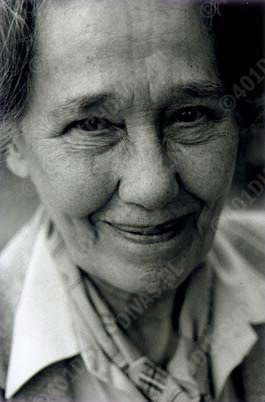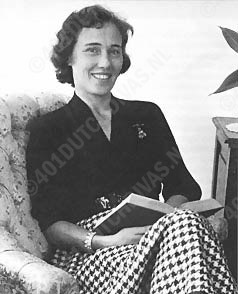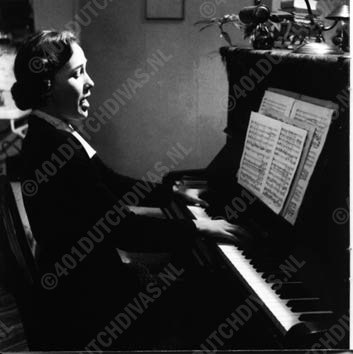Aafje Heynis in interviews
|
.........A white house hidden behind a fence of several meters high, diagonal of a little white church. Years ago she once said in an interview: “A house with a garden where all sorts of things grow in gentle disorder (not a model garden!), and where you can sit in silence, this is my only wish. Because I love plants, flowers and silence more than anything else. Perhaps the last element is a response to the endless mass of sound we produce today."
Aafje Heynis believes in guardian angels. Decidedly, she claims her guardian angel enabled her to take singing lessons. “The reverend Cannegieter of the reformatory church mobilized local industrials to support my studies. They supported me financially, to take lessons and buy clothes.” Aafje Heynis auditioned with Jo Vincent. “But she had no time and that is when I came to Aaltje Noordewier. In two years time she taught me everything.” After her sudden death, Aaltje Noordewier left a foundation, which was instructed to support Heynis. She clearly fore felt the potential of her protégée. And Heynis honored the trust invested in her. Initially she manifested herself in oratorio, but later, under Eduard van Beinum and Bernard Haitink she also manifested herself in the concert repertoire of Mahler, Brahms, Monteverdi, Beethoven and Schubert. The stamp of ‘religious singer’ is not a compliment to her. Yet she is often typecast in that corner, also because of her famous rendition of 'Dank sei Dir, Herr'. "I did not sing opera, but I did appear in oratorio. That caused this typecasting”, she says in the television documentary ‘Voice of the Soul’ from 1995, which caused a new run on her recordings when it was recently rebroadcast. Aafje Heynis maintains that she never listens to records and especially never to those of her own. “I usually can’t agree with them. When you get older you developed new ideas and you would sing things differently. Also I always hear mistakes in myself. This may well be because I listen with the ears of a teacher. I hve been giving lessons since 30 years and this has changed my ear.” As an example she mentions have aria 'Erbarme Dich' from the ‘Matthäus Passion’ that was played during a presentation of the release of the Philips Dutch Masters series, sung by Ilona Durigo. "You can’t sing it in the tempi of my times anymore, because everything goes faster today. 1) The speed of life has tremendously increased. Yet I myself sang it in that slow tempo myself, when I was in my career. Anthon van der Horst was the first to take faster tempi in the ‘Matthäus Passion’. Yet it is the recording by Mengelberg that best documents how we made music in those times. Full devotion and serenity, which is currently often missed. Lines that once demanded two breaths can now be sung on a single breath.” For Aafje Heynis, recordings have mere documentary value, She uses them in teaching, when demonstrating how things in particular pieces were done in the times of Schwarzkopf, Fischer-Dieskau |
|
"The future? The future has yet to start!" Still she bade farewell to the stage in 1983. Her husband, a lawyer, was then very ill. “ For thirteen years we had had a very good marriage. Then he became ill. One evening I was to sing a song in Zaandam. Suddenly I asked myself why I was doing what I was doing? Once outside I told my husband: ‘Its over.’ And that was that. I started in Zaandam, and I finished in Zaandam.’ "She then developed a passion for teaching. Hundreds of singers went through her coaching, among them Charlotte Margiono, who became a close friend. Heynis has an intense relationship with her students, annually about 20. “I feel the need to protect. Some sort of motherly instinct. I am a mother and when I see them doing wrong things, I simply want to prevent bad things to happen to them. Both if they are not courageous enough, and when they are too courageous. The essence of teaching is that it involves humans. In singing you have to reveal your soul. There is no instrument between you and the other. A beautiful, that is what was given to you by – I believe – God. Yet you have to transmit the music to others. One can’t be the right teacher for everyone, and one can’t be the right pupil for everyone either. Sometimes you have to tell them that it is better to look elsewhere. I have said so, yes." After her husband passed away, Aafje Heynis, born in the reformed community, started a spiritual guest for answers. “I was completely freaked out and needed to find peace. I have searched in many churches, reformed ones, protestant ones, and soefis. Yet I did not find the answers.” That changed when the tolling bells of the Catholic church in Naarden invited her on a given day. She went in and attended the service, up until the point of no return, when the holy bread was to be given. “I confessed to the priest that I was not catholic, but he gave me the bread anyway. When I returned to the bench my lower back started moving, and became intensely warm.” She then knew that God had given her a sign. She had found what she had been looking for. A few years ago she officially converted to the catholic church. 
Aafje Heynis tries to stay out of public attention, although her teaching practice still has her in the middle of the musical world. Not everyone can apply with her though; one needs to have completed a Conservatory first. […} Studying with Aafje Heynis does not only mean working hard on interpretation, she also teaches life’s lessons. The two are intertwined, she maintains. The basis of all is ‘respect’. Firstly for the score. “Text and notes are Holy ground. This may be my reformed background, yet I do solemnly believe that one needs a holy respect for the score. I am convinced that some composers were given a deeper view into eternity. When I think that Schubert sold his ‘Erlkönig’ to a local butcher for 50 cents, in order to have food on the table, then I believe I am very privileged to be allowed to sing it. As singers we must transmit the depths of the score as faithful as possible, which eventually is wholly in line with beautiful singing.” Apart from that, Heynis maintains that one must also respect colleagues. […] I had deep respect for among others Anthon van der Horst or Cor Kee, or for teachers such as misses Noordewier 3), Laurens Bogtman and Jo Vincent. All these people radiated something; they were professors. When I started teaching at the conservatory this began to change; a shabby looking young man, once greeted me saying just, ‘Hi’. This proved to be a fellow teacher. After the war, Dutch society became very liberal; we all became equals. That is all fine of course, yet I failed to understand why this had to go hand in hand with giving up good social manners. What does it mean to be brothers and sisters? The right to insult each other at will? Only when you treat the other with respect you will be able to learn something from him.” At the beginning of our conversation, Aafje Heynis maintained that the increased speed of life influenced the way we dealt with music. [...] The shortened duration of the study programs resulted in students having less and less time to explore other things, besides their studies, such as participating in the rich choral life of the Netherlands, or to be able to study quietly at home. To study one needs inner peace. "From time to time I truly sense that we do no longer feel the essence of life glowing within us. We became detached of the cycle of nature. It is now Fall. The beautiful trees in the garden are dropping their leaves and prepare for Winter. Who notices such things today? It is a mystery that one can only look at with appreciation, marveling about the perfection of all. If you can feel this, singing will become like an inspired way of talking, coming from within, naturally. This is the source from which I sang, and also the source for my teaching. Thus working becomes a privilege for which I am grateful…’ Notes |
|
1) One can argue about this. A bit later she seems to correct this by saying the opposite: … the Mengelberg recording is the model, a document of how music was made at the time. Full devote passion, with an inner serenity that can’t be found today. … With this recording I can agree, it was awarded an Edison by the way. 2) For EMI (HMV) Aafje Heynis recorded an LP with highlights of Gluck’s ‘Orfeo ed Euredice’, sung in Italian with participation of the Toonkunstkoor Amsterdam and the Amsterdam Philharmonic Orchestra, conducted by Anton Kersjes. HMV 055-24931. 3) Striking detail.... Aafje (73 years old and a respected vocal teacher) speaks of “Misses Noordewier”, and not of Aaltje Noordewier. Perhaps this also has to do with the air of "Misses Noordewier". More on Aaltje Noordewier-Reddingius on her page in the sopranos section. |
|
Sources: Interview by Ronald Vermeulen, former Chief Editor of ‘Luister’ in Octobre 1997 with the then 73-years old alto Aafje Heynis.
|



 "I am from Zaandam. That is where I belong. I love it here in Blaricum, don’t get me wrong, it is just that I came to realize how important one’s roots are. And these lie there. I was born there and my parents are buried there. I was raised on the banks of the Zaan. We moved over thirteen times, but always to another spot on the river Zaan. My father was a bus driver. He would have wanted to be a stage actor, but that was not an option in those days. Those who weren’t born into the higher circles stood no chance. My mother was a housewife. Mentally she wasn’t very strong. She was always afraid. For what people might say of her. She was very proud of me, yet she has never attended my concerts except for one single time. She was not at home in my world, afraid that people would stare at her. I have inherited some of that shyness. For being afraid. Not daring to stand up for myself. Yet, all this fell of my shoulders on stage. Then I felt strong and protected. By God.".
"I am from Zaandam. That is where I belong. I love it here in Blaricum, don’t get me wrong, it is just that I came to realize how important one’s roots are. And these lie there. I was born there and my parents are buried there. I was raised on the banks of the Zaan. We moved over thirteen times, but always to another spot on the river Zaan. My father was a bus driver. He would have wanted to be a stage actor, but that was not an option in those days. Those who weren’t born into the higher circles stood no chance. My mother was a housewife. Mentally she wasn’t very strong. She was always afraid. For what people might say of her. She was very proud of me, yet she has never attended my concerts except for one single time. She was not at home in my world, afraid that people would stare at her. I have inherited some of that shyness. For being afraid. Not daring to stand up for myself. Yet, all this fell of my shoulders on stage. Then I felt strong and protected. By God.". "I didn’t fit in with it. A great pity, because I would have loved to do opera. I have always been acting, since childhood with my father, and later also in my free time. Unfortunately, the general idea was that I could not act. Once I sang a small role in ‘Giulio Cesare’, and a newspaper wrote ‘Heynis can act after all!’” Regardless, Heynis in opera almost materialized when the Dutch opera put her name on a shortlist for the Orfeo production under conductor Leo Driehuys. 2) Eventually, Heynis was passed over. “That Orfeo went to
"I didn’t fit in with it. A great pity, because I would have loved to do opera. I have always been acting, since childhood with my father, and later also in my free time. Unfortunately, the general idea was that I could not act. Once I sang a small role in ‘Giulio Cesare’, and a newspaper wrote ‘Heynis can act after all!’” Regardless, Heynis in opera almost materialized when the Dutch opera put her name on a shortlist for the Orfeo production under conductor Leo Driehuys. 2) Eventually, Heynis was passed over. “That Orfeo went to 
